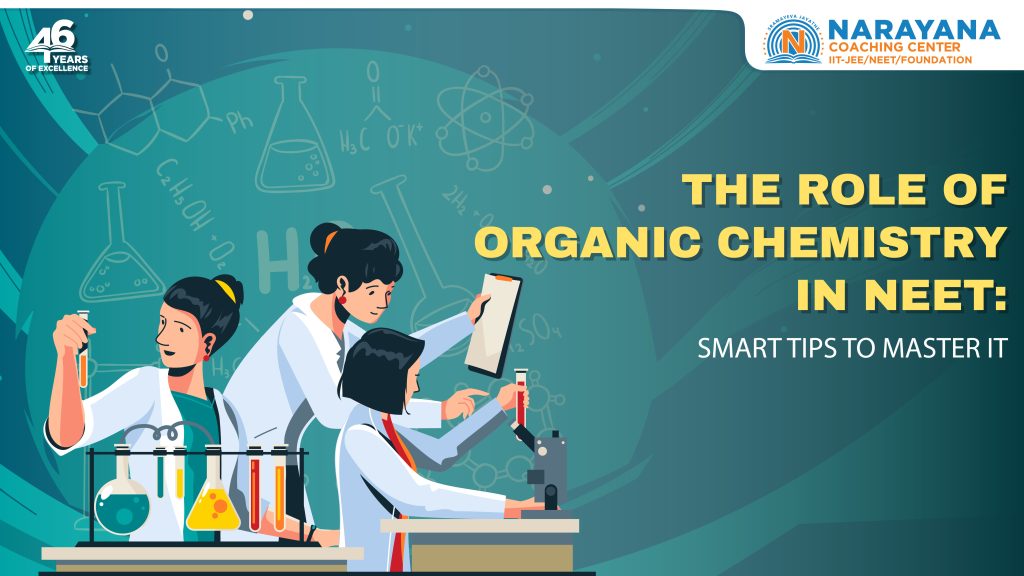
Organic Chemistry plays a pivotal role in NEET (National Eligibility cum Entrance Test), a highly competitive medical entrance examination in India. With nearly 20–25% of the Chemistry section dedicated to Organic Chemistry, mastering this subject can be the game-changer for aspirants. Let’s explore why Organic Chemistry matters so much and how to conquer it with smart preparation strategies.
Why Organic Chemistry is Important in NEET
Organic Chemistry is known for its conceptual depth and practical application. Here’s why it holds a significant place in NEET:
- Weightage: Organic Chemistry contributes around 10–12 questions in NEET Chemistry, offering 40–48 marks.
- Scoring Potential: Conceptual clarity and pattern recognition make it highly scoring with consistent practice.
- Real-life Applications: It lays a strong foundation for biochemistry, pharmacology, and medical sciences.
Prioritize High-Weightage Topics
Focus on topics that are frequently tested:
- General Organic Chemistry (GOC): Backbone of all advanced concepts.
- Hydrocarbons: Mechanisms and reaction types are often asked.
- Aldehydes and Ketones: Known for tricky but common questions.
- Alcohols and Amines: Vital for reaction mechanism questions.
Master Reaction Mechanisms
Organic Chemistry revolves around understanding how and why reactions occur.
- Study Mechanisms Logically: Nucleophilic substitution, electrophilic addition, elimination reactions, etc.
- Focus on Intermediates: Carbocations, carbanions, and free radicals often decide the direction of reactions.
- Use Flowcharts: Visual aids help grasp complex transformations.
Make NCERT Your Bible
For NEET, NCERT is indispensable:
- Direct Questions: Many NEET questions are lifted directly or conceptually from NCERT.
- Clarity of Language: Concepts are simplified and systematically arranged.
- Smart Tip: Highlight important reactions and mechanisms for quick revision.
Practice with Previous Year Papers
One of the smartest ways to prepare:
- Identify Patterns: Analyze recurring question types and topics.
- Time Management: Practice solving organic sections within a fixed time.
- Boost Accuracy: Regular exposure enhances confidence and reduces silly mistakes.
Use Mnemonics for Functional Groups and Reactions
Memory aids can be lifesavers:
- Mnemonic for IUPAC Prefixes: “My Elephant Plays Ball Pretty Handsomely How Cleverly Our Nine Smart People Sing Songs.”
- Name Reactions Mnemonics: For example, “ROH Goes Lucas Shopping” for Lucas Test (R-OH with HCl and ZnCl2).
Regular Revisions are Non-Negotiable
Organic Chemistry is cumulative. Regular revisions ensure long-term retention:
- Daily Short Revisions: Spend 15–20 mins revising previously covered concepts.
- Weekly Reviews: Allocate a day to test yourself on earlier material.
Use Flashcards and Sticky Notes
For quick recall and active engagement:
- Reaction Flashcards: Keep them handy for rapid drills.
- Sticky Notes on Walls: Stick difficult concepts where you can see them daily.
Visual Learning Tools
Leverage multimedia for better understanding:
- YouTube Channels: Use top NEET Organic Chemistry tutorials.
- Reaction Mechanism Animations: Visualize how molecules behave and react.
Take Mock Tests Regularly
Simulate exam conditions to reduce pressure:
- Full-length NEET Mock Tests: Take at least one per week.
- Analyze Mistakes: Track which organic chemistry questions are commonly wrong.
Join Peer Study Groups
Collaborative learning boosts efficiency:
- Doubt Solving: Clarify misconceptions quickly.
- Group Quizzing: Test each other’s knowledge to reinforce concepts.
Avoid Rote Learning
Organic Chemistry demands understanding, not memorization:
- Conceptual Clarity > Mugging Up
- Why Over What: Focus on why reactions occur rather than just memorizing equations.
Use Standard Reference Books Wisely
Apart from NCERT, consider:
- MS Chauhan: For problem-solving and reaction mechanisms.
- Organic Chemistry by Morrison & Boyd: For detailed theoretical understanding.
Stay Consistent with a Study Schedule
Plan and adhere to a structured timetable:
- Divide by Concepts: Allocate specific days for GOC, Hydrocarbons, etc.
- Track Progress: Use a planner to check off completed concepts.
Conclusion: Organic Chemistry as a Gateway to NEET Success
Organic Chemistry, though often considered challenging, can become your strength with the right strategy. Focus on concept-building, smart practice, and consistent revision. With a disciplined approach and trusted resources, this section can significantly enhance your NEET score.
FAQs
- How many questions are asked from Organic Chemistry in NEET?
Approximately 10–12 questions, making it a high-weightage section. - Is NCERT enough for Organic Chemistry in NEET?
Yes, but supplementing with reference books like MS Chauhan is advisable for practice. - What is the best way to remember reactions?
Use mnemonics, flashcards, and revise regularly. - Should I focus more on GOC or name reactions?
Start with mastering GOC as it forms the base for understanding all reactions. - How to improve speed and accuracy in Organic Chemistry for NEET?
Practice previous year papers, take mock tests, and analyze your performance consistently.
